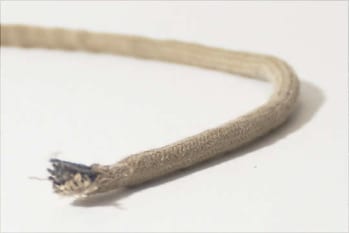 MrPumpernickel / www.instructables.com
MrPumpernickel / www.instructables.com
The daily rigors of tying and untying would soon render our shoelaces frayed and useless if it weren’t for those protective plastic aglets on the ends. Roughly the same situation exists for the chromosomes in your cells. Without protective pieces of DNA on their ends called “telomeres”, repeated rounds of DNA copying would lead to chromosomal breakdown.
The cellular machinery that replicates DNA before cells divide isn’t able to make it to the very end of chromosomes. If it weren’t for the disposable buffer created by the thousands of repetitive DNA base pairs that make up telomeres, critical bits of genetic information would be lost with every cell division.
This protection only can last only so long, however. After 50 or so generations, a cell’s telomeres get so short that they can no longer maintain the genome’s integrity, signaling the end of the line for the cell.
Studies have shown that the “normal” telomere length varies from person to person, but is genetically influenced . In the August 15 issue of Human Molecular Genetics, Massimo Mangino and his colleagues from the University of Leicester identify a gene variant that could play a role in determining telomere length among people with European ancestry.
The researchers found that people with the C version of rs2630578 have telomeres in their white blood cells that are between 400 and 800 base pairs shorter than people with two copies of the other version of this SNP. The authors estimate that this is the equivalent of having cells that are comparatively about 15 to 20 years older, though no actual effects on aging or health were associated with this SNP in the study.
The variant lies in the BICD1 gene, which is part of a cellular pathway regulating protein movements throughout the cell. Studies in yeast have found associations between transport genes like BICD1 and shorter telomeres, but this is the first time such a link has been seen in human studies.
Mangino and his colleagues found that the C version of rs2630578 decreased the amount of BICD1 protein made by cells, which they theorize might affect telomere length. Having either one or two Cs at this SNP seemed to have about the same effect on BICD1 levels, indicating that having two copies of this SNP version might not be any worse than having only one.
As the first study to associate a SNP with telomere length, further work is needed to confirm these findings – and to see if the same SNP might be involved in conditions where shorter telomeres are known to be a factor, such as premature aging syndromes and cancer.



